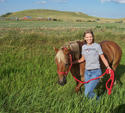As I arrived for a visit, my 90 year old father was perusing ads from his favorite big box store for chicken parts. Seizing the moment that all children savor, I sought to impress him with my declaration: "I buy my chicken parts – albeit at higher prices – at the natural foods store; you know daddy, where the chickens ate naturally off the barn yard floor like they did when you were a boy"? Not missing a beat and dashing my hope for an "at a boy," he retorted: "I saw what those chickens ate off the barnyard floor and I'll buy my chickens at Walmart(s)!" read more »
Heartland
Sponge Cities on the Great Plains
“Sponge cities” is an apt metaphor to describe urban communities in rural states like North Dakota which grow soaking up the residents of surrounding small towns, farms and ranches. North Dakota’s four largest cities, Fargo, Bismarck, Grand Forks and Minot, are growing in large part due to the young adults who for decades gone elsewhere to other regions. In the process, rural North Dakota is facing a protracted population crisis as significant numbers of its small communities are on a slow slide to extinction. This migration pattern is not new, nor is it unique to North Dakota. read more »
Why the Great Plains are Great Once Again
On a drizzly, warm June night, the bars, galleries, and restaurants along Broadway are packed with young revelers. Traffic moves slowly, as drivers look for parking. The bar at the Donaldson, a boutique hotel, is so packed with stylish patrons that I can’t get a drink. My friend, a local, and I head over to Monte’s, a trendy Italian place down the street. We watch a group of attractive 30-something blondes share a table and gossip. They look like the cast of the latest Housewives series. read more »
The G-20's New Balance of Power: The Productive Economy Still Matters
As world leaders gather in Canada this weekend, the nations with the most influence won't be the high-tech mavens. Joel Kotkin on why traditional industries still matter in the post-information age.
Are we entering the post-information age?
For much of the last quarter century, conventional wisdom from some of the best minds of our times, like Daniel Bell, Alvin Toffler and Taichi Sakaiya—in both East and West—predicted that power would shift to those countries that dominate the so-called information age. At the time, this was the right call, but it may increasingly be, if you will, old news. Although there’s no question that iPhones and 3-D movies are nifty—and hedge funds generators of massive wealth for investors and operators—we now may actually be entering what might be called the post-information age. read more »
- Login to post comments
The Declining Human Footprint
There are few more bankrupt arguments against suburbanization than the claim that it consumes too much agricultural land. The data is so compelling that even the United States Department of Agriculture says that "our Nation's ability to produce food and fiber is not threatened" by urbanization. There is no doubt that agricultural production takes up less of the country's land than it did before. But urban “sprawl” is not the primary cause. The real reason lies in the growing productivity of American farms.
Since 1950, an area the size of Texas plus Oklahoma (or an area almost as large as France plus Great Britain) has been taken out of agricultural production in the United States, not including any agricultural land taken by new urbanization (Note 1). That is enough land to house all of the world's urban population at the urban density level of the United Kingdom. read more »
Energy's Other Side
The
But if the oil, gas and coal industries are widely detested on the coasts, people in Bismarck, N.D., have little incentive to join an anti-energy jihad. Like other interior energy centers, people in this small Missouri river city of over 100,000 see their rising oil-, gas- and coal-based economy as the key to a far more lucrative future. read more »
It is Time to Plant
It is springtime in Kentucky – think foals and mares in the pristine meticulously fenced pastures. But, in another part of the state – the Appalachia region of eastern Kentucky – it is time to plant on those rocky hillsides. As my 90 year old father puts it, you plant your corn when tree buds are the size of squirrel ears. I confess to not having given a thought to whether squirrels even have ears or not ... but my father knows. He was born and raised in a part of the world where they know things like that, typical of the mostly Scots-Irish who settled there. read more »
Santa Fe-ing of the World
This is part one of a two-part piece. Read Part two.
Human settlements are always shaped by whatever is the state of the art transportation device of the time. Shoe-leather and donkeys enabled the Jerusalem known by Jesus. Sixteen centuries later, when critical transportation has become horse-drawn wagons and ocean-going sail, you get places like Boston. Railroads yield Chicago – both the area around the “L” (intraurban rail) and the area that processed wealth from the hinterlands (the stockyards). The automobile results in places with multiple urban cores like Los Angeles. The jet passenger plane allows more places with such “edge cities” to rise in such hitherto inconvenient locations as Dallas, Houston, Seattle and Atlanta and now Sydney, Lagos, Cairo, Bangkok, Djakarta, and Kuala Lumpur. read more »
The States and Economic Development, Identifying Top Performers
This is an excerpt from "Enterprising States: Creating Jobs, Economic Development, and Prosperity in Challenging Times" authored by Praxis Strategy Group and Joel Kotkin. The entire report is available at the National Chamber Foundation website, including highlights of top performing states and profiles of each state's economic development efforts.
States throughout American history have done everything they can to cultivate, attract, retain, and grow the businesses that comprise the most fundamental building blocks of their economy. Even in today’s volatile global economy states with severe unemployment and budget woes can point to policies, programs, and investments that foster new economic opportunities and create jobs. read more »
Enterprising States: Creating Jobs, Economic Development, and Prosperity in Challenging Times
This is an excerpt from "Enterprising States: Creating Jobs, Economic Development, and Prosperity in Challenging Times" authored by Praxis Strategy Group and Joel Kotkin. The entire report is available at the National Chamber Foundation website, including highlights of top performing states and profiles of each state's economic development efforts.
Read part two in this series: The States and Economic Development, Identifying Top Performers
The Jobs Imperative: Power to the States read more »






















